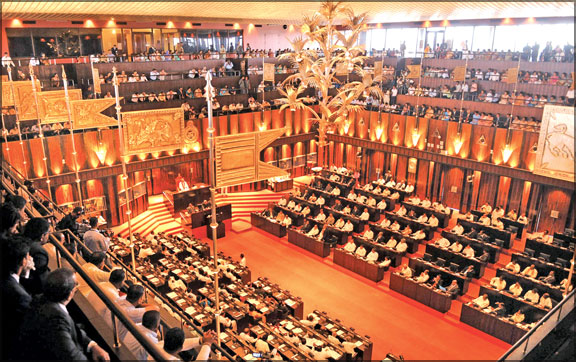New challenges before 14th Parliament
 The main focus of the 14th Parliament which met
for the first time on April 22, will be to take up the task of
constitutional change which is vital for the progress of politics and
good governance in the country, especially in charting a course for
national reconciliation and inclusive development; face up to the issues
of Human Rights and the reforms necessary in the area of Fundamental
Rights to make democracy more meaningful to the people, seek new paths
of progress for the media, while protecting the right of free expression
as required to serve the needs of a democratic society, and also move
towards making Sri Lanka a more humane society The main focus of the 14th Parliament which met
for the first time on April 22, will be to take up the task of
constitutional change which is vital for the progress of politics and
good governance in the country, especially in charting a course for
national reconciliation and inclusive development; face up to the issues
of Human Rights and the reforms necessary in the area of Fundamental
Rights to make democracy more meaningful to the people, seek new paths
of progress for the media, while protecting the right of free expression
as required to serve the needs of a democratic society, and also move
towards making Sri Lanka a more humane society
[Challenges before new Parliament]
* Making constitutional change
* Reconciliation, reconstruction through national unity.
* Making rural economy the driving force
* Taking country to a new era of development
With the United Peopleís Freedom Alliance (UPFA) gaining a landslide
victory with 144 seats of the total of 225, the Government will work on
gaining a two thirdís majority through persuasion and consensus to make
constitutional amendments possible.
The 14th Parliament convened after widely accepted free and fair
elections held island-wide after the defeat of terrorism that held
nearly one -third of the country under its brutal control for nearly 30
years, thereby making the Writ of the Parliament by the Diyavanna Oya at
Kotte, apply throughout the country after that prolonged period of
separatist terror.
The new Parliament will need to face up to the challenges of
reconciliation and reconstruction, and economic progress through
equality and national unity. The greatest builder of roads since the
British Governor Edward Barnes (1824 - 1831) and the leader who has
built most bridges in Sri Lanka in the short span of four years as Head
of State and Government, President Rajapaksa, will seek through the new
Parliament to take the people of Sri Lanka on new roads and bridges of
unity, that will bind them in the years to come; putting aside the
decades of mistrust and disunity caused by terrorist violence, and the
failure of leaders past to address the pressing issues of social and
economic inequality in the country.
|

The inaugural meeting of the 14th Parliament |
The 14th Parliament is at a crucial point in the Sri Lankan history
tasked with realizing the new potentials of the country apparent with
the end to the obstacle of terrorism. The Parliamentís vision for the
country will be for a united commitment to progress, ready to eschew all
differences of ethnicity, faith and caste that have divided Sri Lankan
society for so long, especially through 60 years and more of
independence.
With new blood that has entered this Parliament, people have kept
faith in the new generations that are emerging. Parliament will need to
give emphasis on a future where the rural economy will be the driving
force behind the growth of Sri Lanka, supported by the service sector,
especially Tourism and related activities that will properly use both
the natural and cultural assets the country has been endowed with by
nature and history.
The new Parliament will be expected to take Sri Lanka to a new era of
development in peace and through peace. Industrial growth will be
necessary, but in keeping with the new thinking of sustainable
development, with zero or the least damage to the environment, where
industry will be both sustainable and the emphasis will be on renewable
sources of energy. Under the Presidentís leadership, Sri Lanka will also
not shy away from the use of nuclear energy, where necessary, with the
emphasis on the least pollution, with a minimal carbon footprint through
lesser dependence on imported fossil fuel for the countyís energy needs.
These are some of the challenges that the new Parliament will be
charged with.
It will be required to bring Sri Lanka to new heights of progress,
using the advantages it already has in widespread literacy and health
services that surpass many other lands with similar socio-economic
backgrounds.
The country will need to be moved towards the rapid rise of IT
literacy which was 25 percent in the past four years, and emphasize the
use of both Sinhala and Tamil in the public services, and expand the
teaching of English, to make it a life skill, especially for the youth
from the rural and economically less advantaged layers of urban society.
The future trends in the economic policy are already evident in the
success being recorded in many indices.
Despite a worldwide economic crisis Sri Lanka achieved 3.5 percent
growth in 2009 with it rising to 6.2 percent in the final quarter after
the defeat of terrorism.
Inflation declined to 4.8 percent by the end of 2009. GDP per capita
for 2009 increased to eight percent while the per capita income reached
USD 2053 in 2009 indicating an overall improvement in living standards.
The number of tourist arrivals to Sri Lanka went up 2.1 percent in
2009 with the end to decades of terrorism.
There are welcome indications that this trend is continuing with a
substantial increase in arrivals in the First Quarter this year, and the
selection of Sri Lanka as the venue for international events of repute
such as the International Indian Film Awards (IIFA) 2010. |



